The 7 Healthiest Beans You Can Eat, According to Science
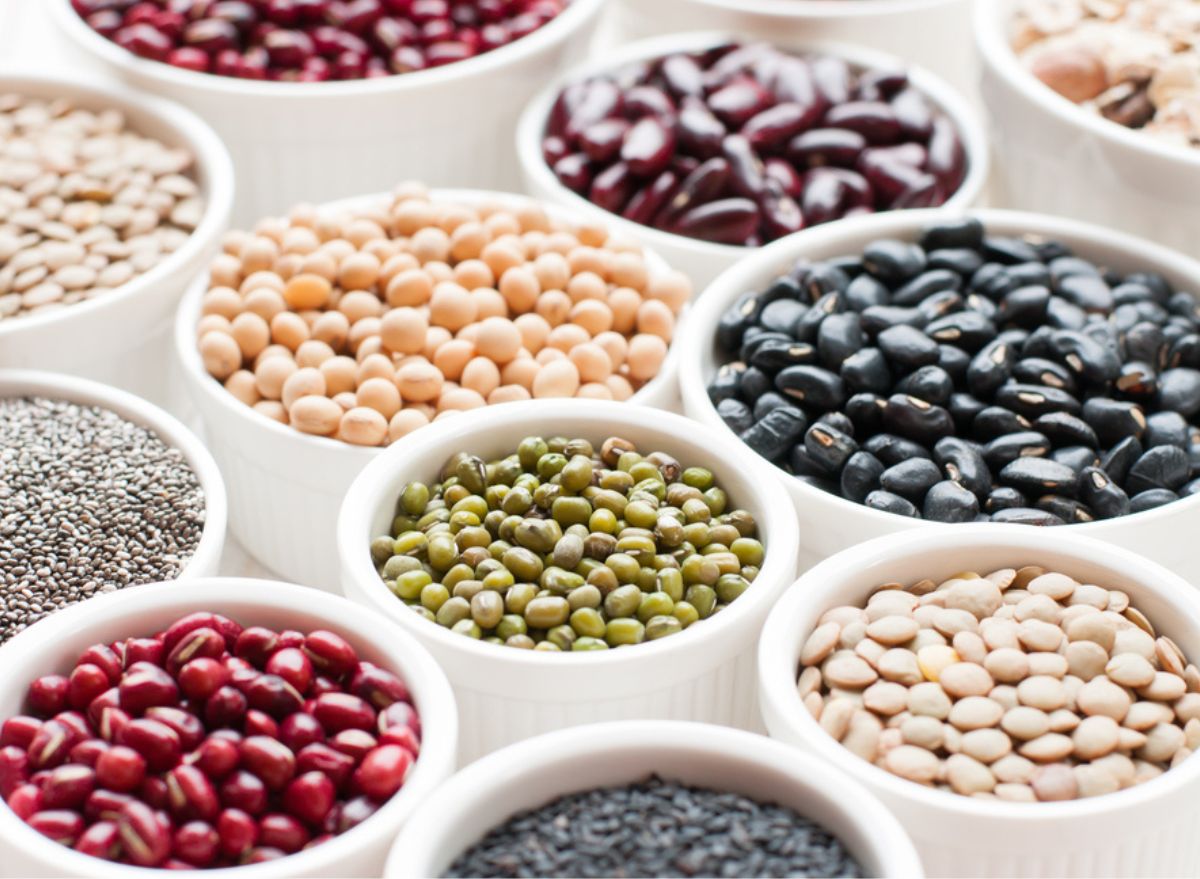
If you’re not regularly eating beans in your diet, it may be time for a change. Beans are the seeds of a variety of different plants and are technically considered part of the vegetable family, and they are, without a doubt, some of the healthiest foods you can consume.
Just look to the world’s Blue Zones for proof. These regions across the globe contain the highest concentrations of centenarians—people who live for 100 years or more and have some of the lowest rates of chronic disease in the world—and one of the main pillars of these centenarian diets is the consumption of beans. For example, the people of Nicoya, Costa Rica eat black beans daily, those in Okinawa, Japan enjoy soybeans, and the people of Icaria, Greece consume white beans and chickpeas.
Research also shows that including beans as part of a mostly plant-based diet can help improve heart health, manage weight, reduce chronic inflammation, and help protect against disease. But how exactly are beans this healthy? Their main health benefits are due to their high content of fiber, protein, important vitamins, and antioxidants.
But even though beans in general are extremely healthy, there are hundreds of different varieties that exist, all with their own unique nutrient profiles and health benefits. To help narrow it down, we gathered 7 of the healthiest beans you can consume based on nutrition and what recent research says, but in no particular order.
Read on, then check out the 25 Superfoods To Add to Your Grocery List in 2024.
Black Beans
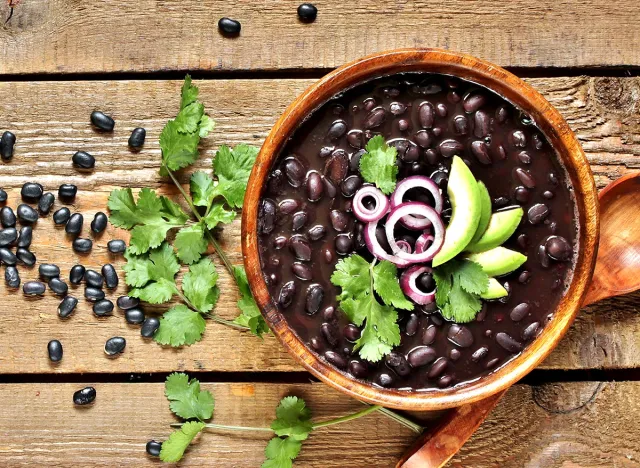
Black beans are some of the healthiest in the world, but what makes them this way? Like most beans, you’ll get a major fiber and protein boost in each serving, as well as B vitamins, iron, and magnesium.
According to Nutrients, including black beans with a regular Western diet has been found to help manage insulin responses and modify cardiovascular disease risk in adults with Metabolic syndrome, mostly because of its high fiber and antioxidant content.
Also, another report in Nutrients notes that typically, darker-colored beans (like black beans) are denser in antioxidants and polyphenol plant compounds than lighter-colored beans.
One interesting finding showed that eating black beans and chickpeas with white rice can help improve the glycemic response and therefore help prevent blood sugar spikes—another win for black bean lovers!
Chickpeas/Garbanzo Beans
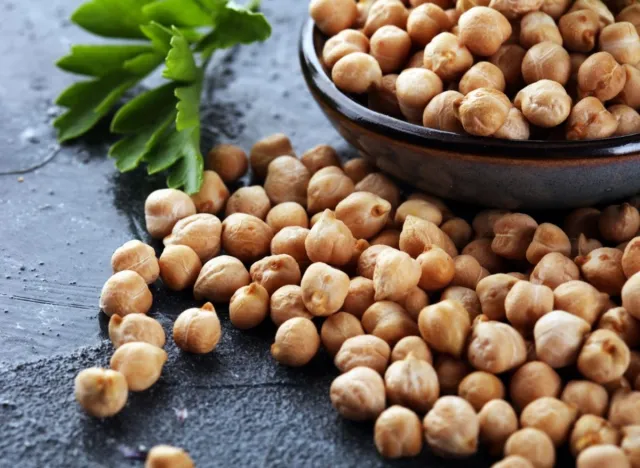
You know them either as chickpeas or garbanzo beans, but whatever name you choose, you’re bound to enjoy some health benefits when you eat these beans.
For starters, chickpeas are high in both protein (7 grams per 1/2 cup) and fiber (6 grams per 1/2 cup), making them an extremely filling snack choice and one that can help with gut health and weight loss and management.
According to a report published in the journal Nutrients, the benefits of chickpeas expand even beyond fiber and protein intake. This report states that chickpea consumers have been found with higher intakes of vitamins E, A, and C, as well as folate, magnesium, iron, and healthy fats. Not only that, but there is evidence that eating chickpeas or hummus (a dip made from chickpeas) can help with weight management and blood sugar regulation, and even aid in reducing factors of heart disease.
Cannellini Beans
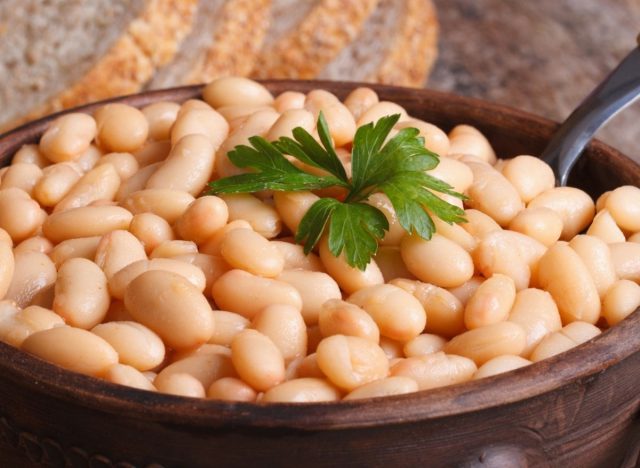
White beans, also called Cannelleni or White Kidney Beans, can provide a variety of different benefits for your health.
These beans are one of the higher-protein legumes on our list, making it a filling food for those wanting a plant-based protein. You’ll also find that white beans are rich in potassium, offering between 35-46% of your daily value, which is a nutrient that can help control blood pressure, prevent kidney stones, and improve bone health.
Along with potassium, white beans will give you a magnesium boost with around 12-16% of your recommended daily intake. Getting adequate levels of magnesium is extremely beneficial in preventing cardiovascular disease, type 2 diabetes, asthma, and osteoporosis.
Lupin Beans
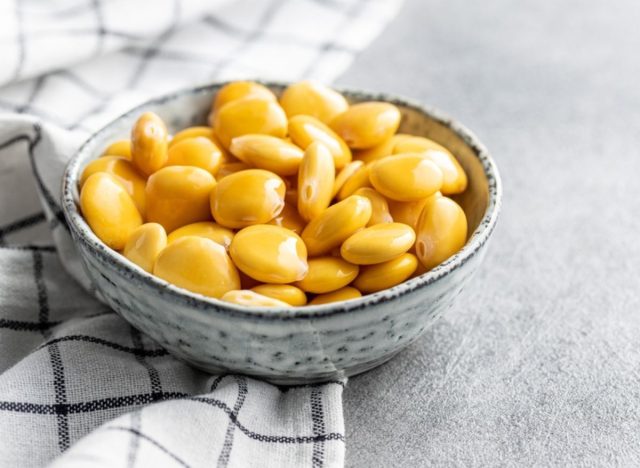
The health benefits of lupin beans, also called “lupini” beans, aren’t talked about as often as legumes like black beans or chickpeas, but that doesn’t mean that these beans aren’t bursting with nutritional benefits.
These beans aren’t as high in fiber as some of the others on our list with about 2 grams per serving, but what it lacks in fiber it makes up for in protein, with around 13 grams per every 1/2 cup—making it higher in protein than any other choice here.
A recent report published in the journal Molecules discussed three major components of lupin beans that make them so healthy: their high protein content, their healthy unsaturated fats, and their rich antioxidant plant compounds. One compound that these beans are especially rich in is carotenoids, which can help your body fight free radicals and prevent oxidative stress damage, which in turn can help prevent a multitude of diseases like cancer and heart disease.
Another report, published in the journal Nutrients, found that eating lupins—in whole form or just the lupin fiber and protein—had positive effects on blood pressure levels, satiety, and weight loss. The whole lupins contributed better results than the fibers and proteins, but all three categories saw benefits.
Pinto Beans
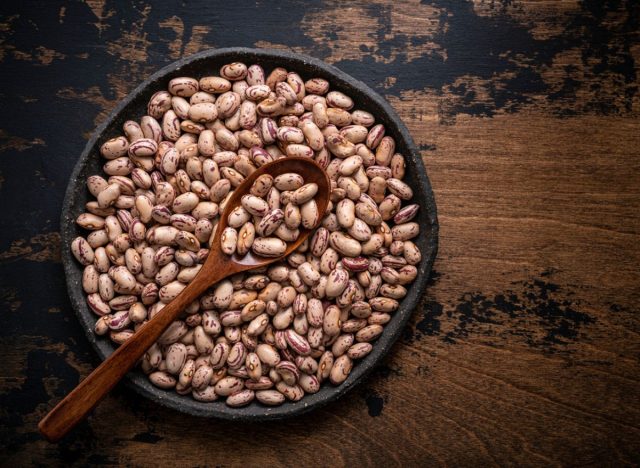
Probably best known as being a part of Mexican and Tex-Mex dishes or alongside ham hock in some southern meals, pinto beans are fiber-filled, protein-rich brown beans chock-full of nutrients.
Aside from the high fiber and protein content that you get in any type of bean, pinto beans are high in beneficial nutrients like iron and selenium.
In a serving of pinto beans, you’ll get around 11-25% of your daily recommended intake of iron (11% for women, 25% for men), which can help you prevent iron deficiency that may lead to headaches, fatigue, heart problems, and possible complications for pregnant women.
You’ll also get about 5 micrograms of selenium in a serving of pinto beans, which is around 11% of your daily recommended intake. Research shows that regularly consuming enough selenium can help prevent cardiovascular disease, thyroid disease and complications, cognitive decline, and even certain cancers.
Soybeans
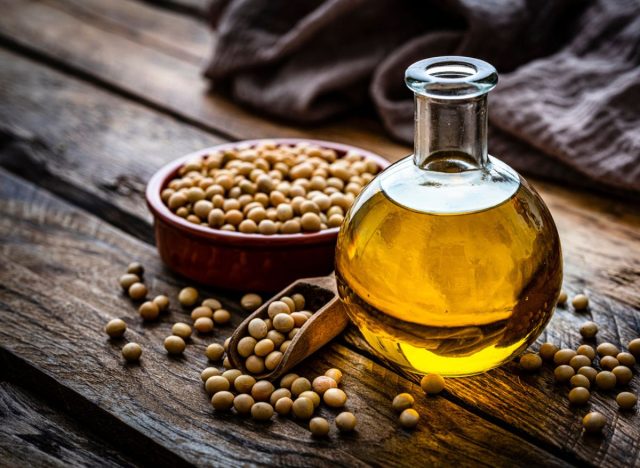
You’ve most likely had soybeans before but may not have known that’s what you’re eating. Edamame, for example, are immature green soybeans, and other foods like tofu, tempeh, miso, soy sauce, and soy milk are all made from a base of soybeans as well.
Soybeans provide protein, fiber, and healthy fats, as well as other valuable nutrients like calcium, potassium, iron, and selenium.
One thing that makes soybeans so special apart from other beans is that it is considered a complete protein. This means that they contain all nine essential acids that your body doesn’t produce, so you have to get them through food. Most complete proteins are animal products—except for a few plant sources like quinoa and soybean-based foods, and most incomplete proteins are plant-based foods. It can be difficult for vegans or vegetarians to get enough complete proteins in their diet, which is why soybeans and products made from soybeans can be helpful for those on a plant-based diet.
A study published in Nutrients also shows that soy has been linked to reducing the risk of chronic diseases like coronary heart disease, breast cancer, and prostate cancer. Frontiers in Nutrition also notes a link between soy consumption and cardiovascular disease prevention.
Navy Beans
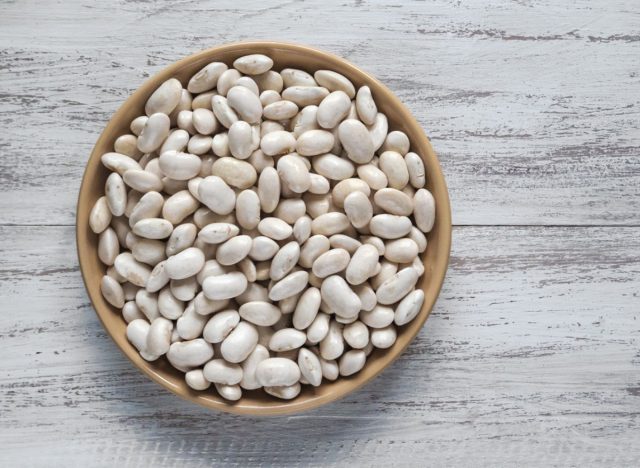
Navy beans are a type of white bean that you may want to add to your diet, especially if you need more fiber, protein, and B vitamins in your daily diet.
These beans get a lot of their health benefits from their high content of B vitamins, especially B1 (thiamine) or B9 (folate). A serving of navy beans will give you about 0.2 micrograms of thiamine, which is around 16% of your daily value. This vitamin is necessary for the growth and function of cells, as well as the functioning of energy metabolism. You’ll also get about 32% of your daily value of folate in a serving of navy beans, which is a crucial vitamin for cognitive function and cognitive decline prevention, as well as cardiovascular disease prevention.
- Source: Buettner D, Skemp S. Blue Zones: Lessons From the World's Longest Lived. Am J Lifestyle Med. 2016 Jul 7;10(5):318-321. doi: 10.1177/1559827616637066. PMID: 30202288; PMCID: PMC6125071.
- Source: Mullins AP, Arjmandi BH. Health Benefits of Plant-Based Nutrition: Focus on Beans in Cardiometabolic Diseases. Nutrients. 2021 Feb 5;13(2):519. doi: 10.3390/nu13020519. PMID: 33562498; PMCID: PMC7915747.
- Source: Mullins AP, Arjmandi BH. Health Benefits of Plant-Based Nutrition: Focus on Beans in Cardiometabolic Diseases. Nutrients. 2021 Feb 5;13(2):519. doi: 10.3390/nu13020519. PMID: 33562498; PMCID: PMC7915747.
- Source: FoodData Central. (n.d.-ac). https://fdc.nal.usda.gov/fdc-app.html#/food-details/173735/nutrients
- Source: Reverri EJ, Randolph JM, Steinberg FM, Kappagoda CT, Edirisinghe I, Burton-Freeman BM. Black Beans, Fiber, and Antioxidant Capacity Pilot Study: Examination of Whole Foods vs. Functional Components on Postprandial Metabolic, Oxidative Stress, and Inflammation in Adults with Metabolic Syndrome. Nutrients. 2015 Jul 27;7(8):6139-54. doi: 10.3390/nu7085273. PMID: 26225995; PMCID: PMC4555112.
- Source: Mullins AP, Arjmandi BH. Health Benefits of Plant-Based Nutrition: Focus on Beans in Cardiometabolic Diseases. Nutrients. 2021 Feb 5;13(2):519. doi: 10.3390/nu13020519. PMID: 33562498; PMCID: PMC7915747.
- Source: Winham DM, Hutchins AM, Thompson SV. Glycemic Response to Black Beans and Chickpeas as Part of a Rice Meal: A Randomized Cross-Over Trial. Nutrients. 2017 Oct 4;9(10):1095. doi: 10.3390/nu9101095. PMID: 28976933; PMCID: PMC5691712.
- Source: FoodData Central. (n.d.-ct). https://fdc.nal.usda.gov/fdc-app.html#/food-details/173757/nutrients
- Source: Fu J, Zheng Y, Gao Y, Xu W. Dietary Fiber Intake and Gut Microbiota in Human Health. Microorganisms. 2022 Dec 18;10(12):2507. doi: 10.3390/microorganisms10122507. PMID: 36557760; PMCID: PMC9787832.
- Source: Moon J, Koh G. Clinical Evidence and Mechanisms of High-Protein Diet-Induced Weight Loss. J Obes Metab Syndr. 2020 Sep 30;29(3):166-173. doi: 10.7570/jomes20028. PMID: 32699189; PMCID: PMC7539343.
- Source: Wallace TC, Murray R, Zelman KM. The Nutritional Value and Health Benefits of Chickpeas and Hummus. Nutrients. 2016 Nov 29;8(12):766. doi: 10.3390/nu8120766. PMID: 27916819; PMCID: PMC5188421.
- Source: FoodData Central. (n.d.-ad). https://fdc.nal.usda.gov/fdc-app.html#/food-details/175204/nutrients
- Source: Office of Dietary Supplements - Potassium. (n.d.). https://ods.od.nih.gov/factsheets/Potassium-Consumer/
- Source: Office of Dietary Supplements - magnesium. (n.d.). https://ods.od.nih.gov/factsheets/Magnesium-HealthProfessional/
- Source: Al Alawi AM, Majoni SW, Falhammar H. Magnesium and Human Health: Perspectives and Research Directions. Int J Endocrinol. 2018 Apr 16;2018:9041694. doi: 10.1155/2018/9041694. PMID: 29849626; PMCID: PMC5926493.
- Source: FoodData Central. (n.d.-af). https://fdc.nal.usda.gov/fdc-app.html#/food-details/173804/nutrients
- Source: Estivi, L.; Brandolini, A.; Gasparini, A.; Hidalgo, A. Lupin as a Source of Bioactive Antioxidant Compounds for Food Products. Molecules 2023, 28, 7529. https://doi.org/10.3390/molecules28227529
- Source: Eat the Rainbow: The Health Benefits of Carotenoids. (2023, December 21). Cleveland Clinic. https://health.clevelandclinic.org/carotenoids
- Source: Bryant L, Rangan A, Grafenauer S. Lupins and Health Outcomes: A Systematic Literature Review. Nutrients. 2022 Jan 13;14(2):327. doi: 10.3390/nu14020327. PMID: 35057507; PMCID: PMC8777979.
- Source: Office of Dietary Supplements - Iron. (n.d.-b). https://ods.od.nih.gov/factsheets/Iron-HealthProfessional/
- Source: Iron-Deficiency Anemia | NHLBI, NIH. (2022, March 24). NHLBI, NIH. https://www.nhlbi.nih.gov/health/anemia/iron-deficiency-anemia#:~:text=Undiagnosed%20or%20untreated%20iron%2Ddeficiency,their%20treatments%20to%20work%20poorly.
- Source: Office of Dietary Supplements - selenium. (n.d.). https://ods.od.nih.gov/factsheets/Selenium-Consumer/
- Source: FoodData Central. (n.d.-ae). https://fdc.nal.usda.gov/fdc-app.html#/food-details/174271/nutrients
- Source: Clinic, C. (2023b, December 21). What are complete proteins? Cleveland Clinic. https://health.clevelandclinic.org/do-i-need-to-worry-about-eating-complete-proteins
- Source: Messina M. Soy and Health Update: Evaluation of the Clinical and Epidemiologic Literature. Nutrients. 2016 Nov 24;8(12):754. doi: 10.3390/nu8120754. PMID: 27886135; PMCID: PMC5188409.
- Source: Messina M, Duncan A, Messina V, Lynch H, Kiel J, Erdman JW Jr. The health effects of soy: A reference guide for health professionals. Front Nutr. 2022 Aug 11;9:970364. doi: 10.3389/fnut.2022.970364. PMID: 36034914; PMCID: PMC9410752.
- Source: Office of Dietary Supplements - thiamin. (n.d.). https://ods.od.nih.gov/factsheets/Thiamin-HealthProfessional/#:~:text=*DV%20%3D%20Daily%20Value.,years%20and%20older%20%5B11%5D.
- Source: Folate (Folic acid) – vitamin B9. (2023, March 7). The Nutrition Source. https://www.hsph.harvard.edu/nutritionsource/folic-acid/#:~:text=RDA%3A%20The%20Recommended%20Dietary%20Allowance,and%20500%20mcg%20DFE%2C%20respectively.









